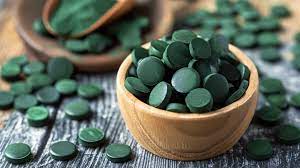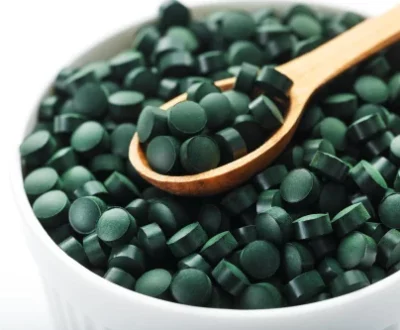Health Benefits of Spirulina

The Health Benefits of Spirulina: A Comprehensive Guide
Spirulina, a blue-green algae that has been consumed for centuries due to its remarkable nutritional profile, has earned a reputation as one of the most potent “superfoods” on the planet. Packed with protein, vitamins, minerals, antioxidants, and essential fatty acids, spirulina has become a staple in the wellness and nutrition communities. From supporting immune health and detoxification to promoting muscle recovery and mental clarity, the health benefits of spirulina are vast and multifaceted.
In this comprehensive guide, we’ll explore the numerous health benefits of spirulina, its unique nutritional composition, scientific evidence supporting its benefits, and how it can contribute to better overall health. Whether you are considering adding spirulina to your diet for improved fitness, weight management, or general wellness, this article will provide you with all the information you need to understand why spirulina deserves a place in your daily routine.
What is Spirulina?
Spirulina is a type of cyanobacteria (a group of blue-green algae) that grows in both freshwater and saltwater environments. It has been used for thousands of years as a food source, with ancient civilizations like the Aztecs and other Mesoamerican cultures incorporating it into their diets. Today, spirulina is typically grown in controlled aquaculture farms and harvested in dry powder, tablet, or capsule form, making it easily accessible worldwide.
Spirulina is considered a complete food due to its exceptionally high concentration of protein, vitamins, minerals, and phytonutrients. It contains all nine essential amino acids, making it a perfect protein source for vegetarians and vegans. It is also a rich source of antioxidants, including chlorophyll, carotenoids, and phycocyanin, which give it its characteristic blue-green color.
Nutritional Composition of Spirulina
To fully appreciate the health benefits of spirulina, it’s important to understand the nutrients it contains. Spirulina’s nutritional profile is what makes it a superfood:
1. High-Quality Protein
Spirulina is made up of approximately 60-70% protein by weight, making it one of the most protein-dense foods available. Unlike many plant proteins, spirulina provides all nine essential amino acids, which are necessary for various bodily functions, including muscle repair, immune support, and the synthesis of enzymes and hormones.
2. Vitamins
Spirulina is a rich source of several B vitamins, including B1 (thiamine), B2 (riboflavin), B3 (niacin), and B12 (though the latter is not always bioavailable to humans, especially in plant-based forms). It also contains vitamin A (in the form of beta-carotene), vitamin K, and vitamin E, which are essential for maintaining healthy skin, eyes, immune function, and antioxidant defense.
3. Minerals
Spirulina contains a wealth of essential minerals, including iron, magnesium, calcium, potassium, and zinc. These minerals are vital for maintaining bone health, muscle function, energy levels, and overall well-being.
4. Essential Fatty Acids
Spirulina contains beneficial fatty acids, including omega-3 and omega-6 fatty acids, which play an important role in heart health, brain function, and reducing inflammation.
5. Antioxidants
Spirulina is packed with antioxidants, including phycocyanin, beta-carotene, chlorophyll, and zeaxanthin. These compounds help neutralize free radicals in the body, reducing oxidative stress and protecting cells from damage that can lead to chronic diseases.
Health Benefits of Spirulina
Given its rich nutritional profile, spirulina offers an array of health benefits that can improve both physical and mental well-being. Let’s explore the most significant health benefits of spirulina, supported by scientific evidence.
1. Boosts Immune System Function
One of the most well-known benefits of spirulina is its ability to strengthen the immune system. Spirulina contains bioactive compounds such as phycocyanin, vitamin C, and vitamin E, which have potent antioxidant properties that can help protect the body from harmful pathogens.
Additionally, spirulina has been shown to increase the production of white blood cells and antibodies, both of which play a crucial role in defending the body against infections. Studies suggest that spirulina may help enhance the immune response in both healthy individuals and those with compromised immune systems, making it particularly useful during cold and flu season.
2. Supports Detoxification
Spirulina is also known for its detoxifying properties. Due to its high chlorophyll content, spirulina can help cleanse the liver and digestive system by removing toxins, heavy metals, and other waste products. Chlorophyll binds to toxins, assisting in their elimination through the digestive tract.
Spirulina has been shown to be particularly effective in detoxifying heavy metals, such as arsenic and mercury, from the body. This detoxifying effect can help reduce the burden on the liver and kidneys, promote better digestion, and enhance overall vitality.
3. Improves Gut Health and Digestion
Spirulina contains a variety of prebiotics, which are compounds that promote the growth of beneficial bacteria in the gut. A healthy gut microbiome is essential for proper digestion, nutrient absorption, and overall health. By supporting the growth of good bacteria and inhibiting the growth of harmful microorganisms, spirulina can help balance gut flora and support digestive health.
Moreover, spirulina is rich in digestive enzymes, which can help break down food more efficiently, alleviating bloating and indigestion. It may also have mild laxative properties, helping to relieve constipation and promote regular bowel movements.
4. Promotes Heart Health
Several studies suggest that spirulina may help improve heart health by positively affecting blood pressure, cholesterol levels, and triglycerides. Spirulina has been shown to lower LDL cholesterol (the “bad” cholesterol) while raising HDL cholesterol (the “good” cholesterol). These effects contribute to a healthier cholesterol profile and a reduced risk of cardiovascular diseases.
Spirulina’s ability to lower blood pressure is also well-documented. Studies have shown that it can help relax blood vessels and improve blood flow, leading to a reduction in blood pressure. Additionally, spirulina’s anti-inflammatory and antioxidant effects help reduce oxidative stress, which plays a role in heart disease development.
5. Enhances Physical Performance and Muscle Recovery
Spirulina is a popular supplement among athletes and fitness enthusiasts due to its potential to enhance exercise performance and speed up recovery. The high protein content in spirulina helps repair muscle tissue after strenuous activity, while the amino acids support muscle growth and strength.
Several studies have shown that spirulina supplementation may improve endurance and stamina. One study found that athletes who took spirulina had improved aerobic capacity and were able to exercise for longer periods without fatigue. Additionally, spirulina’s antioxidant properties help reduce exercise-induced oxidative stress and muscle soreness, speeding up recovery.
6. Supports Weight Loss and Metabolic Health
Spirulina has been studied for its potential role in weight management and metabolic health. As a low-calorie food that is rich in protein, spirulina can help suppress appetite and promote a feeling of fullness, reducing overall calorie intake. The protein in spirulina also helps stabilize blood sugar levels and prevent spikes in insulin, which can help reduce cravings and support healthy metabolism.
Spirulina’s ability to increase fat metabolism and reduce fat accumulation has been demonstrated in animal studies, and there is evidence to suggest that it may help with fat loss when combined with a healthy diet and exercise routine.
7. Improves Brain Function and Mental Clarity
The nutrient-rich composition of spirulina also supports brain health and cognitive function. Spirulina contains omega-3 fatty acids, B vitamins, and antioxidants, all of which play a role in maintaining healthy brain cells, improving memory, and reducing the risk of neurodegenerative diseases.
Some research suggests that spirulina may have neuroprotective effects and may help reduce symptoms of anxiety and depression. The antioxidants in spirulina help protect brain cells from oxidative damage, which is believed to contribute to age-related cognitive decline and conditions like Alzheimer’s disease.
8. May Help Regulate Blood Sugar Levels
Spirulina has shown promise in regulating blood sugar levels, making it a potential supplement for individuals with diabetes or those at risk of developing the condition. Several studies have found that spirulina can help improve insulin sensitivity, lower blood glucose levels, and reduce the risk of complications related to diabetes.
The protein and fiber in spirulina can help stabilize blood sugar by slowing the absorption of sugar in the bloodstream. Moreover, spirulina’s anti-inflammatory and antioxidant effects may help mitigate the oxidative stress that is often associated with diabetes.
9. Protects Against Allergies
Spirulina has been studied for its ability to reduce symptoms of allergies, particularly seasonal allergies like hay fever. Studies suggest that spirulina can reduce inflammation in the nasal passages and lower levels of histamine, a compound responsible for allergy symptoms like sneezing, itching, and congestion.
By modulating the immune system’s response to allergens, spirulina may help reduce the severity of allergic reactions and promote overall respiratory health.
10. Improves Skin Health
Spirulina’s high content of antioxidants, vitamins, and minerals makes it a powerful ally for skin health. It has been shown to help reduce the appearance of wrinkles, fine lines, and age spots by neutralizing oxidative stress and protecting skin cells from free radical damage. Additionally, spirulina’s anti-inflammatory properties can help reduce skin irritation, redness, and acne.
When
applied topically, spirulina can also promote skin hydration and may support wound healing. Due to its rich nutrient profile, spirulina is often used in skincare products for its rejuvenating and anti-aging effects.
How to Incorporate Spirulina into Your Diet
Now that you’re familiar with the many health benefits of spirulina, you might be wondering how to incorporate it into your daily routine. Spirulina is typically available in powder, tablet, or capsule form. Here are some simple and delicious ways to include spirulina in your diet:
- Smoothies: Add a teaspoon of spirulina powder to your favorite smoothie for a nutrient boost. It pairs well with fruits like bananas, berries, and mangoes.
- Energy Bars: Mix spirulina powder into homemade energy bars for a nutritious snack.
- Salads: Sprinkle spirulina powder over salads or mix it into dressings.
- Soups and Stews: Stir spirulina powder into soups, stews, or broths for an extra nutrient kick.
- Water: Simply dissolve a teaspoon of spirulina powder in water or coconut water for a quick health shot.
- Baked Goods: Add spirulina powder to your favorite baked goods like muffins or pancakes for a nutrient-packed treat.
Conclusion
Spirulina is a nutrient-dense superfood with a wide range of health benefits, from boosting immunity and detoxifying the body to supporting heart health, brain function, and physical performance. Whether you are looking to improve your overall health, boost your energy levels, or support your fitness goals, spirulina offers a powerful and natural way to enhance your well-being.
With its rich protein content, array of vitamins and minerals, and antioxidant properties, spirulina is a valuable addition to any diet. However, it’s important to start with small doses to see how your body responds and consult a healthcare provider if you have any underlying health conditions. By incorporating spirulina into your daily routine, you can tap into its incredible health benefits and enjoy a healthier, more vibrant life.
Subscribe to our Newsletter.
Keep Reading
See all posts
Terms | Privacy | Disclaimer
© 2012-23 Kalptaru Agro. All Rights Reserved



